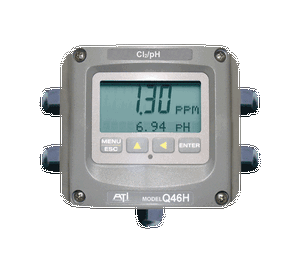- Home
- Products
- Water Measurements
- Analytical Technology Inc.
- Chlorine
- Q46H/62-63 Residual Chlorine Monitor
Q46H/62-63 Residual Chlorine Monitor
Free Chlorine or Monochloramine in Potable Water
- General Details
- Benefits
- Features
- Sensor & Flowcell Options
- Sensor Stabilization
- Documents
Chlorine Monitor is an upgraded version of our proven Q45H system for continuous water quality monitoring of free or combined chlorine. Monitor capabilities have been expanded to include options for a 3rd analog output or for adding additional low power relay outputs. Digital communication options for Profibus DP, Modbus RTU or Ethernet IP have been added, as well.
The Q46H system uses a polarographic membraned sensor to measure chlorine directly, without the need for chemical reagents. When needed, automatic pH compensation may be added for highest free chlorine measurement accuracy. Systems are available to provide 4-20 mA outputs for chlorine, pH, and temperature to allow easy CT calculations.
Q46H systems are economical to purchase, economical to maintain, and provide long term accuracy and reliability for your chlorine monitoring needs.
 EASY INSTALL!
EASY INSTALL!
Want to simplify installation?
ATI can supply the Q46H complete with sample flow controls mounted to a PVC back plate ready to mount. Connect power, water sample, and analog/relay outputs and you’re ready to go. Systems are available with or without a flow switch for remote indication of loss of sample.
Free or Combined Chlorine
Q46H Monitors are factory set for either Free or Combined Chlorine measurement, but can easily be converted from one to the other in the field.
Economical Operation
Reagent-less operation and low parts cost makes the Q46H your best choice for chlorine monitoring applications in potable water, wastewater, cooling water, or high purity water systems.
Automatic pH Compensation
For free chlorine monitoring under widely varying pH conditions, automatic pH compensation may be added to maintain the highest measurement accuracy at pH levels up to 9.5.
Dual Chlorine/pH Monitoring
Even when pH correction is not required, adding a pH sensor to the system converts the monitor to a dual analyzer, providing 4-20 mA outputs for both chlorine and pH.
Flexibility
Programmable range options from 0-200 PPB up to 0-200 PPM provide maximum application flexibility.
AC or DC Power Options
Power options include universal 90-260 VAC or 12-24 VDC.
Analog Output Options
Two isolated 4-20 mA outputs are standard, with an option for a third output if required. Default setting provides analog outputs for chlorine and pH.
PID Output
Standard PID control function assignable to one analog output.
Digital Communications
Available in either Profibus-DP, Modbus-RTU or Ethernet-IP.
Relay Outputs
Three SPDT relays are standard, with relay functions programmable for alarm, control, or trouble indication. Three additional low power relays available as an option.
Flexible Mounting
NEMA 4X (IP-66) enclosure is suitable for wall, pipe, or panel mounting.
Clear Display
Back-lit large LCD display provides clear visibility in any lighting conditions. A scrolling second line on the display provides additional information and programming prompts.
Two types of chlorine sensors are available. One is designed for flowcell installation, and the other is for submersion applications. Free chlorine monitoring should always be done using a flowcell system. Good control of sample flow and pressure is important for accurate measurement. The standard constant-head flowcell should be used for most applications. A sealed flowcell and a low-volume flowcell are also available for special applications. Consult your ATI representative for application assistance.
Submersible combined chlorine sensors can sometimes be used for measuring total chlorine in wastewater effluent. Wastewater effluents containing more than 1 PPM of ammonia, often result in a chlorine residual that is more than 90% monochloramine. Direct measurement with a submersible sensor can provide a dependable monitor without all the sampling and chemicals associated with total chlorine measurement.
Chlorine sensors, especially free chlorine, require up to 8 hours of stabilization time when first installed or after membrane change. ATI offers a battery powered “polarizer” that can be used to stabilize a spare sensor so it is ready to run within a few minutes of installation. Polarizers simply plug into the sensor connector and require no adjustments.

